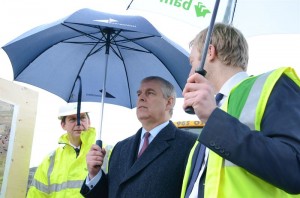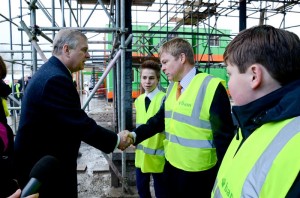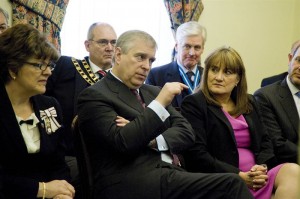Young people should be encouraged to get an all-round education fit for the modern workplace before they leave school, the Duke of York said yesterday following his high-profile visit to Swindon.
The Duke, who has a strong interest in education, innovation and technology, met business leaders and the directors of the town’s yet-to-open University Technical College (UTC) during his visit.
Afterwards he said: “I believe that we need to give young people the right skills so they can make the right choices – whether that is going onto further education, working in industry or starting their own business.”
He said not all young people wanted to – or needed to – go to university. Instead they should be encouraged to learn skills, through apprenticeships, that are needed in the modern workplace.
Pictured: HRH The Duke of York with Craig Madders of BAM
The UTC will equip its students with the type of modern engineering and technology skills that businesses in Swindon need if the town is to build on its industrial heritage.
After talking to business leaders at a meeting hosted by Business West, the organisation behind the Swindon & Wiltshire Initiative, the Duke met head teachers from Swindon secondary schools to discuss the development of the UTC and what it will bring to the town.
He was then shown around the UTC construction site in the Railway Village by its principal Angela Barker-Dench, where he met some of its first intake of students as well as workers from builders BAM.
Following the visit, Ms Barker-Dench said: “This is another historic moment for UTC Swindon. HRH has a passion for engineering, manufacturing and apprenticeships, which really shone through today when he was meeting with everybody. It was fantastic to hear him talk about his core values and beliefs regarding skills in the workplace which coincide directly with what UTC Swindon will be doing.”
Pictured: HRH The Duke of York at the UTC Swindon site with Craig Madders of BAM, right
As Patron of the Baker Dearing Educational Trust – which is promoting a nationwide chain of UTCs – the Duke encourages wider support from parents, businesses and other stakeholders. He supports enterprise-focused education and helps providers promote the opportunities they offer.
The Duke’s visit came two weeks after the founder of the Baker Dearing Educational Trust and former Education Secretary, Lord (Kenneth) Baker visited the UTC site.
UTC Swindon opens this September and when fully operational will cater for 600, 14 to 19 year olds interested in pursuing careers in engineering.
Construction work on the £10m state-of-the-art building in Bristol Street started last November. 
The old school building and the iconic water tower on the site – both Grade-II listed – will be key features of the college.
Pictured: The Duke of York meets UTC students
Learning at the UTC will be achieved through employer set ‘projects’ which will tackle real industry issues. Students will be grouped into learning companies where they will learn to act and behave in teams. These companies will provide pastoral support and will act as a vehicle for enterprise, competition and performance management. Engineering employers will provide project support and work experience.
Alongside engineering, all 14 -16 year olds will also take core subjects at GCSE and relevant A Levels will be on offer at post-16. There will be a wide range of enrichment activities and physical education.
Industry partners supporting the UTC include major Swindon companies BMW UK Manufacturing Ltd, Alcatel-Lucent, Halcrow Group Ltd, Honda of the UK Manufacturing, Intel, Network Rail, Nationwide Building Society and Thames Water. A link is also being developed with the proposed new Ministry of Defence Technical Support Unit at the former RAF Lyneham base.
Pictured: The Duke with UTC principal Angela Barker-Dench, right
No students will miss out on the core curriculum or basic qualifications. For 14–16 year old students (Key Stage 4), technical studies will account for 40% of the curriculum with the other 60% spent on core subjects. Learning will cover aspects of the major disciplines in engineering – chemical, civil, electrical, mechanical. In addition, all students will study a range of GCSEs including mathematics, English and science, with options to do a modern foreign language. For post-16 students (Key Stage 5) technical studies will account for 60% of the curriculum and core studies 40%, with relevant A Levels on offer for progression to university. Careers guidance will be available, particularly for support into higher level engineering courses and employment in the sector.
Time will also be dedicated to physical education, citizenship, careers education and guidance, and personal, health and social education. Work experience will also be very important as a key part of the curriculum and student experience.














